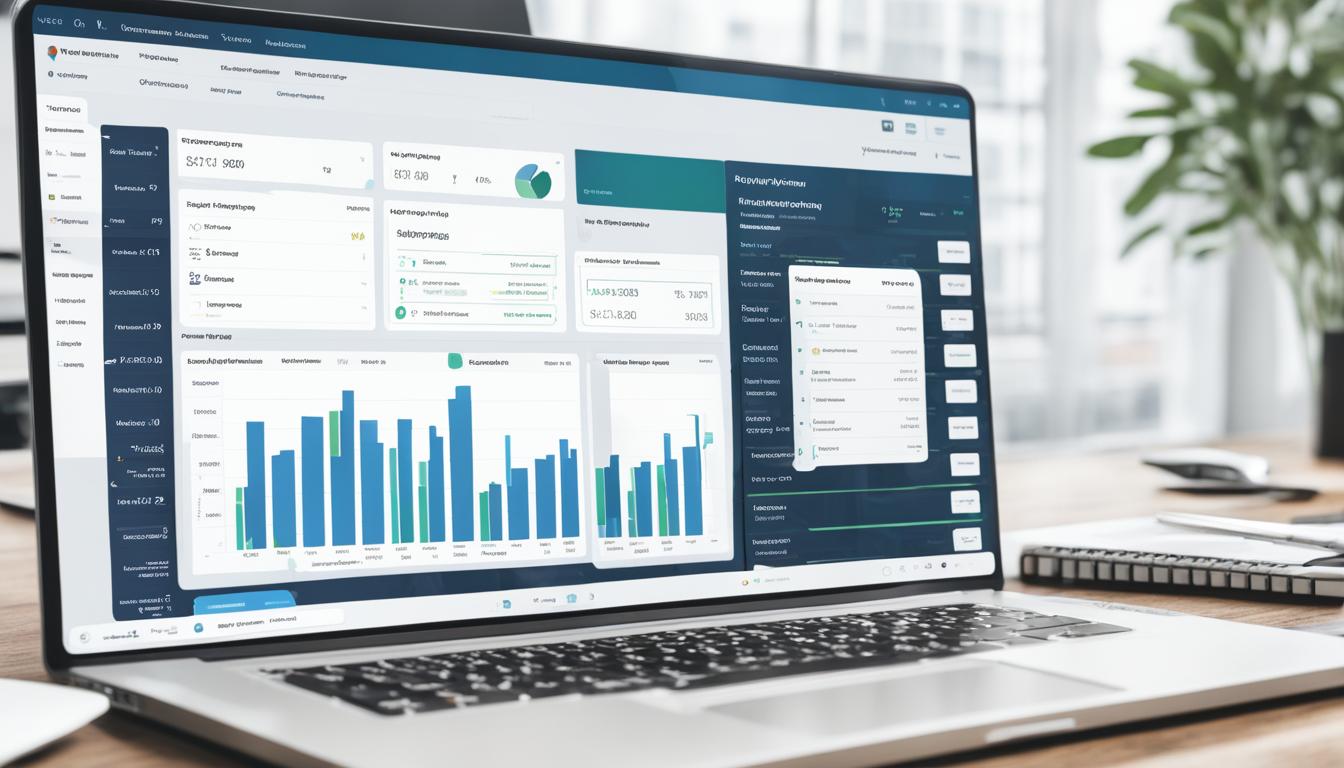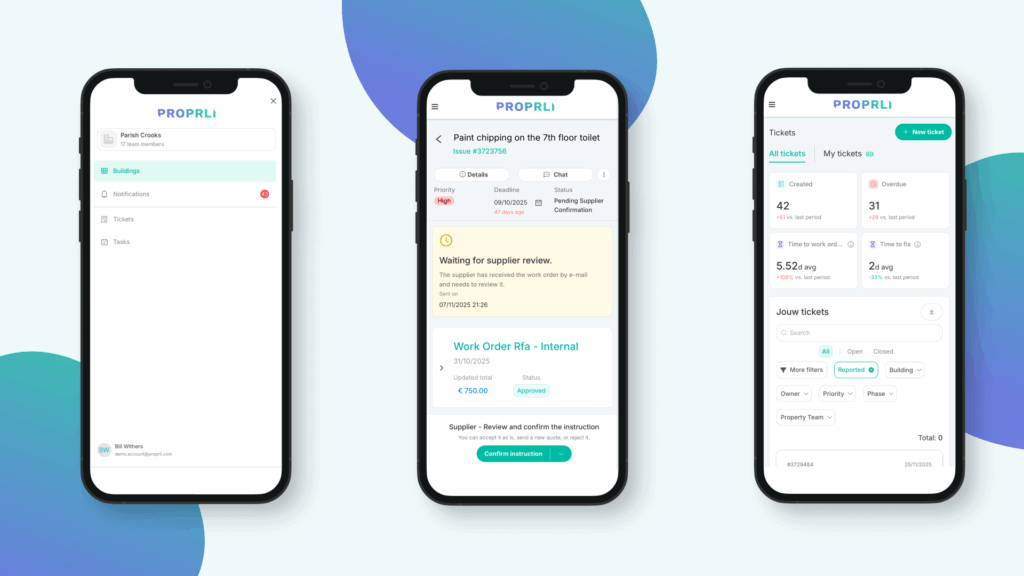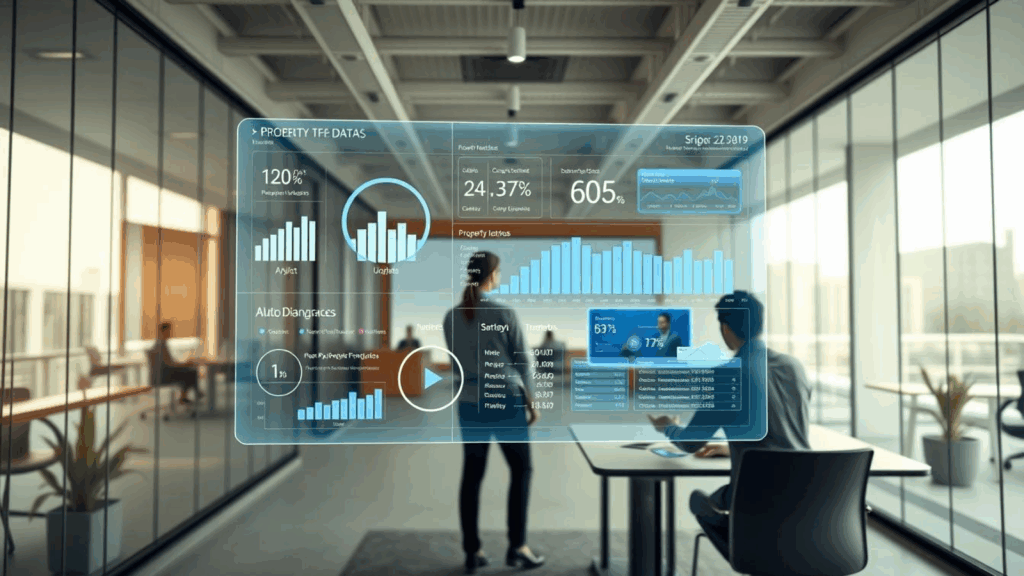Central to the daily operations of landlords and property managers, property management accounting software significantly enhances business efficiency. It offers automated budget management, comprehensive financial insights, and critical cash flow analyses. The integration of such software into all aspects of property management operations leads to improved productivity across staff, tenant interactions, and overall business activities. Smart property management software with accounting platforms not only provide streamlined operations but also foster a sense of confidence within the staff, reducing daily stress and aiding in better decision-making. As firms expand, optimizing accounting processes becomes increasingly essential.
Key Takeaways
- Property management accounting software enhances business efficiency.
- Automated budget management, financial insights, and cash flow analyses are core features.
- Integration of accounting software leads to improved productivity in all aspects of property management operations.
- Companies can save time, reduce stress, and make informed decisions with property management software with accounting features.
- Accounting process optimization is crucial as real estate firms expand.
Introduction to Property Management Accounting
Property management accounting is a vital cog in the wheel of modern real estate businesses, encompassing essential tasks such as tracking rent payments, managing budgets, and reconciling accounts. As the real estate sector evolves, the integration of accounting software for property managers has become increasingly crucial, allowing for a more streamlined and efficient approach to the supervision of finances and transactions. To fully understand the importance of these software solutions, it is necessary to delve into the various tasks that make up property management accounting and how software platforms address these challenges.
In property management accounting, the focus is on financial operations that are specific to the management of real estate properties. Some typical tasks include:
- Rent collection and tracking
- Managing budgets for property maintenance and improvements
- Reconciling accounts and generating financial statements
- Ensuring compliance with financial regulations
- Handling vendor payments and owner disbursements
What is accounting software for property management and how does it support these essential activities? In a nutshell, it is specialized software designed to automate, organize, and streamline the various accounting tasks faced by property managers, allowing them to efficiently and accurately manage their financial responsibilities. Gone are the days of manual processes, paper-based records, and time-consuming calculations – with the right software in place, property managers can have a better grasp on their finances and make more informed decisions.
Accounting software for property managers provides a range of benefits, such as:
- Automation of recurring tasks, such as rent collection and expense tracking
- Accurate and timely financial reporting
- Improved budgeting and cash-flow management
- Enhanced data security and compliance
- Integration with other property management functions like tenant screening and maintenance tracking
By choosing a suitable accounting software solution for their property management business, managers can empower themselves with valuable insights, greater control, and enhanced efficiency in their financial operations, setting the stage for successful property management now and in the future.
What is Accounting Software for Property Management
Accounting software for property management serves as a central hub for all financial operations within a real estate company, automating key tasks such as recurring transactions, ensuring consistency in accounting activities, and offering accurate data visualization and reporting services. The best accounting software for property management provides a range of integrated accounting services, allowing for the comprehensive management of budgets, client and tenant funds with a focus on diligence and precision.
The power of top accounting software for property management extends beyond mere bookkeeping; it integrates with other business functions such as online payments, expense tracking, and service management. This holistic business approach leads to a friction-less operation system that underpins the efficacy of a property management business.
Centralizing Financial Operations
A property management accounting system consolidates all financial data in one place, making it easier to manage and analyze. In doing so, this software simplifies the management of accounts receivable, accounts payable, and general ledger, providing users with a clear and organized financial overview. As a result, property managers are better-equipped to make informed decisions regarding the business’s financial health and stability.
Integrating with Other Business Functions
Effective property management accounting software seamlessly integrates with other critical business functions, streamlining financial management and offering a holistic approach to property management. Key functions it integrates with include:
- Online rent collection and tenant portals
- Maintenance request tracking and service coordination
- Expense management and budgeting tools
- Performance analytics and reporting
These integrations ensure that all aspects of property management, from tenant interactions to financial reporting, are efficiently managed, providing property managers with a comprehensive system to address any challenges they may encounter.
Automating Routine Financial Tasks
Automation is a cornerstone benefit of utilizing accounting software solutions for property management, eliminating the manual handling of transactions and minimizing the risk of errors. Property management accounting software automates a wide range of tasks, allowing property managers to focus on more critical business decisions and enhancing the company’s overall efficiency.
Below are some of the key automated tasks that accounting software for property management can handle:
- Processing rent payments and generating invoices
- E-payments to vendors for services rendered
- Owner disbursements, including income and expense allocations
- Bank reconciliation
- Generation of financial reports and statements
- Tracking expenses and budgeting
Automating these routine financial tasks not only reduces the risk of errors but also saves precious time for property managers. This increased efficiency leads to more effective business operations and contributes positively to the company’s bottom line.
In addition to reducing the chances of human errors and saving time, modern property management accounting software also offers integration capabilities, allowing financial data to be seamlessly shared across various departments and systems, making the property management process even more efficient.
As property management firms grow and expand, the significance of automating routine financial tasks will become increasingly essential in maintaining streamlined operations and ensuring optimal efficiency.
Boosting Budget Management and Cash Flow
A critical advantage of property management accounting software is the ability to provide up-to-date financial insights, facilitating a robust budget management strategy. Cloud-based accounting software for property management aids professionals in managing cash flows effectively, allowing them to make sound financial decisions backed by real-time data and analytics.
Tracking Accurate Financial Insights
Property management software with accounting comes with sophisticated in-depth reporting and visualization tools. These empower managers with the necessary information for strategic decision-making. Analyzing cash flow statements, weighing owner statements, and assessing income reports are now easy tasks, allowing property managers to monitor financial performance accurately, consistently, and with ease.
Fostering Informed Decision Making
With access to real-time financial data, property managers can make informed decisions on business development. Having a comprehensive understanding of company finances allows them to identify areas with potential growth, as well as areas in need of improvement. This leads to a more strategic approach to business development, optimizing resources, and focusing on thriving avenues.
| Benefits of Accounting Software | Impact on Property Management |
|---|---|
| Real-time financial insights | Enables precise, data-driven decisions and optimized strategies |
| Automated budget management | Reduces manual errors and improves overall financial performance |
| Accurate cash flow monitoring | Provides a solid foundation for planning future investments |
| In-depth reporting and analytics | Offers valuable insights into trends and patterns for better decision-making |
In conclusion, accounting software for property management is indispensable for efficient business operations. By providing real-time financial insights and fostering informed decision-making, these tools aid property managers in developing successful budget strategies, effectively managing cash flows, and steering their businesses towards growth and productivity.
Improving Productivity Through Integration
A key advantage of an advanced property management accounting system is its ability to enhance overall business productivity through seamless integration. By merging accounting processes with other core functions such as marketing, maintenance, and investor relations, property management companies can centralize their management, leading to a streamlined and efficient system that simplifies operations for non-accountant staff as well.
It is essential to understand how software integration can improve productivity. The table below highlights the three critical areas of property management and the corresponding benefits of incorporating accounting software:
| Property Management Area | Benefits of Accounting Software Integration |
|---|---|
| Marketing | Improves budget tracking, enables consistent reporting, and simplifies analysis of marketing ROI |
| Maintenance | Streamlines expense tracking and management, automates invoicing, and enhances communication between maintenance staff and property managers |
| Investor Relations | Provides accurate financial reporting, ensures timely communication, and fosters investor confidence through well-organized and transparent processes |
By integrating these areas with a property management accounting system, companies can increase efficiency across departments and provide a more comprehensive management approach, empowering employees to focus on their core responsibilities and enhancing the overall business performance.
Accounting Automation and Its Impact on Operations
The implementation of accounting software for property managers brings about significant enhancements in daily operations, relieving staff of tedious manual tasks and optimizing financial transactions for both the business and its tenants. Let us examine the key ways in which property management software with accounting improves the real estate management experience.
Reducing Daily Stress for Real Estate Teams
Property management teams often face high levels of daily stress, resulting from time-consuming manual accounting tasks and the potential errors that accompany them. By automating these processes, accounting software platforms enable staff to focus on customer service and other high-value tasks, ultimately leading to increased workplace satisfaction and enhanced team performance.
Streamlining Tenant and Business Activities
One of the primary advantages of property management software with accounting is the ability to streamline tenant and business activities. Through features like online payment processing, a centralized view of banking activities, and simplified record-keeping processes, this software effectively manages financial transactions while eliminating the risk of human errors or inconsistencies. Consequently, tenants enjoy timely and accurate transactions, and businesses can effortlessly stay on top of their financial obligations.
Key Features of Top Accounting Software for Property Management
Choosing the best accounting software for property management entails understanding the key features that comprise a top-notch property management accounting system. These features streamline daily operations, automate essential tasks, and ensure compliance. Let’s delve into the fundamental characteristics of high-quality accounting software tailored for property management companies.
- Lease-based accounting: This feature enables property managers to manage intricate financial transactions according to specific lease terms and conditions, ensuring accuracy and reducing errors.
- Built-in e-payment systems: Empowering property managers with seamless transactions, this feature automates rent payments, vendor payments, and owner disbursements, offering convenience for all parties involved.
- Customizable reporting tools: Comprehensive reporting capabilities provide insights into the company’s financial performance, enabling informed decision-making and strategic growth planning.
Considering these essential features helps property management companies identify the best accounting software tailored to their specific needs and requirements, thereby achieving optimal operational efficiency.
SaaS-Based Accounting Solutions: A Game Changer
As the property management industry evolves, SaaS-based accounting solutions have emerged as revolutionary tools to streamline and optimize financial operations. By offering cloud-based services, these platforms overcome the challenges associated with traditional software and provide numerous advantages to property managers.
Eliminating the Hassles of Traditional Software
One of the primary benefits of cloud-based accounting software for property management is the elimination of issues commonly faced with traditional software. SaaS-based solutions remove the need for constant updates and minimize compatibility problems, ultimately resulting in an up-to-date, adaptable, and scalable platform. This allows property management companies to focus on growth and expansion, without being hindered by outdated and rigid systems.
Providing Seamless Remote Access
In today’s increasingly mobile world, the ability to access accounting platforms from any location is invaluable. Cloud-based property management accounting software provides seamless remote access, enabling property managers to handle financial transactions, oversee accounts, and access crucial documents from virtually anywhere. This flexibility is essential for professionals who need to stay on top of their financial responsibilities, even when they’re away from the office.
In conclusion, SaaS and accounting software for property management have revolutionized the industry by offering a more efficient and versatile alternative to traditional systems. With a strong focus on adaptability, scalability, and accessibility, cloud-based accounting solutions are proving to be a game-changer for property managers looking to streamline their financial operations and drive their businesses forward.
Enhanced Data Security and Compliance Measures
Property management companies handle sensitive financial data daily, and they need to ensure the security of this information to avoid data breaches and protect their clients’ trust. To address this concern, top accounting software for property management incorporates enhanced security protocols and compliance measures that keep data safe and adhere to the latest industry regulations and standards.
Accounting software solutions for property management constantly aim to prevent unauthorized access and protect crucial financial data by:
- Utilizing encryption techniques
- Employing multi-factor authentication
- Requiring strong passwords
- Offering frequent security updates and patches
Besides data security, top accounting software ensures compliance with industry-specific regulations and standards. Some essential compliance features include:
- Automated 1099 form generation
- Electronic filing options for taxes
- Tracking and managing trust accounts
- Auditing and internal control features
To minimize financial risks, property management firms need to stay up-to-date with these regulations and standards. By implementing top accounting software solutions for property management, companies gain peace of mind knowing that their financial data is secure, and they are compliant with the relevant rules and industry norms.
Cost Savings and Long-Term Efficiency Benefits
Investing in the right property management accounting software offers numerous advantages that directly translate into significant cost savings and long-term efficiency improvements for property management businesses. By automating repetitive and error-prone tasks, these sophisticated solutions minimize the likelihood of mistakes arising from manual data entry, leading to tighter financial management and improved reporting accuracy.
Minimizing Human Errors
One of the vital benefits of using the best accounting software for property management lies in its ability to reduce human errors. By streamlining financial processes, automating tasks, and eliminating the need for redundant manual interventions, such platforms help cut down on time and resources required for correcting mistakes. This ultimately translates into cost savings for the business, as well as increased confidence in the accuracy of financial data and reporting.
Facilitating Faster Financial Turnaround
Another essential feature of a property management accounting system is its ability to expedite the financial operations associated with property management. From processing payments to closing monthly books, these systems enable a swifter financial turnaround. This acceleration aligns with the dynamic pace of property management business cycles and enables property management firms to stay ahead of the curve and respond proactively to changes in the market.
In conclusion, the use of accounting software for property managers provides numerous cost-saving opportunities and drives significant long-term efficiency improvements. By reducing human errors, streamlining financial processes, and facilitating faster financial turnaround times, these software solutions have become an indispensable tool for successful and competitive property management firms.
Choosing the Right Accounting Software for Your Property Management Firm
When selecting the ideal accounting software for a property management firm, it’s crucial to consider the specific needs and growth trajectory of the business. This involves evaluating features such as reporting capabilities, user interface, integration options, and the type of support offered by the software provider, all to ensure the chosen system aligns perfectly with company goals and operations.
- Reporting capabilities: The best accounting software solutions for property management provide comprehensive and customizable financial reports, delivering real-time insights that enable data-driven decision making. Look for software that offers detailed income statements, balance sheets, cash flow statements, and tenant account histories.
- User interface: A user-friendly software interface will make it easier for property managers and other staff members to navigate and utilize the software’s features. Examine the layout, organization, and overall usability of the software, taking into account the learning curve for new users.
- Integration options: Seamless integration with other key property management tools, such as marketing, maintenance, and tenant portals, will help streamline operations further. Consider both current and future integration needs when evaluating potential accounting software solutions.
- Software support: Access to reliable customer support from the software provider is vital for resolving issues and maintaining efficient operations. Investigate the provider’s support offerings, including availability, response time, and methods of communication such as phone support, chat or email.
In conclusion, determining what is accounting software for property management that best fits your specific requirements and long-term objectives is key to driving efficiency and growth within a property management firm. Invest time in understanding the unique features and capabilities of different software options available in the market, and make an informed decision that will support the sustainable success of your property management business.
Conclusion
The fast-paced nature of today’s real estate environment calls for the implementation of efficient and comprehensive property management accounting systems. These systems, such as industry-leading accounting software for property managers, offer numerous benefits that significantly enhance the financial management aspect of property management businesses.
From providing real-time reporting and superior data security to enabling cost savings, accounting software for property management optimizes operational efficiency and propels firms towards streamlined workflows and sustained growth. By taking advantage of tailored software solutions, property management companies can ensure they are well-equipped to tackle the challenges of a dynamic market.
Ultimately, selecting the right property management accounting software is crucial for staying ahead of the competition and maintaining a successful real estate business. As the industry continues to evolve, embracing modern, data-driven systems will be the key to unlocking new opportunities and achieving lasting success.
FAQ
What is accounting software for property management?
Accounting software for property management is a specialized tool that centralizes all financial operations within a real estate company, automating key tasks, ensuring consistency in accounting activities, and offering accurate data visualization and reporting services. It integrates with other business functions such as online payments, expense tracking, and service management, leading to a friction-less operation system that underpins the efficacy of a property management business.
How does property management accounting software improve budget management and cash flow?
Property management accounting software boosts budget management and cash flow by providing up-to-date financial insights, allowing property managers to make sound financial decisions backed by real-time data and analytics. With in-depth reporting and visualization tools, managers can analyze cash flow statements, weigh owner statements and income reports, and shape an informed approach to business development.
What are the key features of top accounting software for property management?
Top accounting software for property management includes features such as lease-based accounting, built-in epayment systems, accurate 1099 form generation, and customizable reporting tools. These features help automate tasks, ensure compliance, and keep financial processes organized for optimal operational efficiency.
How does cloud-based accounting software differ from traditional solutions?
Cloud-based accounting software eliminates the cumbersome aspects of traditional software setups, such as constant updates and incompatibility issues, providing a platform that is up-to-date, adaptable, and designed for scalability. It offers the convenience of remote access and enhanced security protocols and compliance features, ensuring data protection and adherence to industry regulations and standards.
What should be considered when choosing accounting software for a property management firm?
When selecting the ideal accounting software, consider the specific needs and growth trajectory of the business. Evaluate features such as reporting capabilities, user interface, integration options, and the type of support offered by the software provider to ensure the chosen system aligns perfectly with company goals and operations.






